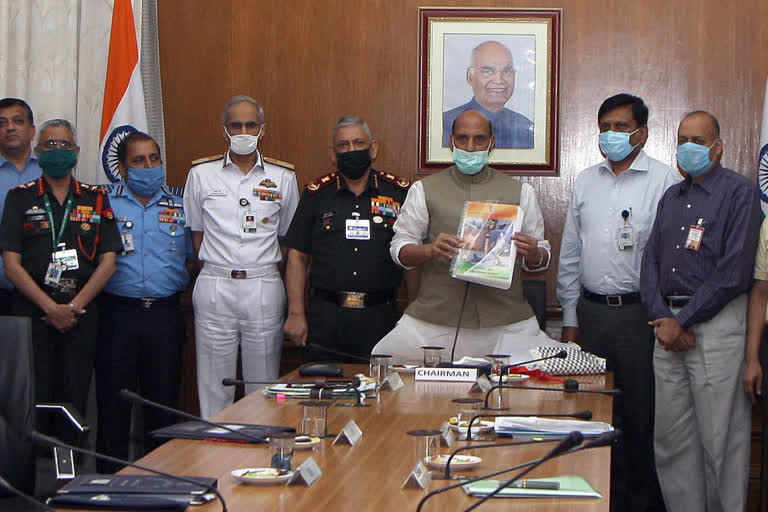New Delhi: The Defence Ministry on Monday announced key changes in its acquisition policy, with the government now allowing procurement of military equipment on lease by deciding not to have an offset clause in three types of deals - government-to-government, inter-government and single vendor defence deals.
The decision was part of the country's new policy for defence acquisitions, which was approved by the defence acquisition council (DAC), headed by Defence Minister Rajnath Singh.
Apurva Chandra, Special Secretary and Director General (Acquisition) said, "We have made changes in offset guidelines. From now on, there would be no offset clause in government-to-government, inter-government and single vendor defence deals."
While speaking after the unveiling of new Defence Acquisition Procedure (DAP) 2020 in New Delhi, Chandra said that in other deals there would be offset policy. He said that as per revision in offset guidelines the preference would be given to the manufacturing of complete defence products over components and various multipliers have been added to give incentivisation in the discharge of offsets.
On September 23, India's federal auditor pulled up Rafale-maker Dassault and its weapons producer for not fulfilling their offset commitment to transfer technology to India as part of the 2016 contract for 36 combat jets.
The country's financial watchdog Comptroller and Auditor General (CAG) in an audit report on Management of Defence Offsets tabled in Parliament flagged that foreign vendors made various offset commitments to qualify for the main supply contract but later were not earnest about fulfilling these commitments.
The report stated, "..in the offset contract relating to 36 Medium Multi-Role Combat Aircraft (MMRCA), the vendors M/s Dassault Aviation and M/s MBDA initially proposed (September 2015) to discharge 30 per cent of their offset obligation by offering high technology to DRDO."
DRDO wanted to obtain Technical Assistance for the indigenous development of engine (Kaveri) for the Light Combat Aircraft.
READ: Delhi Police to seek advocates' help to file charge sheet
"Till date the vendor has not confirmed the transfer of this technology," the CAG stated in the report.
India has procured 36 Rafale combat aircraft from Dassault Aviation in a government-to-government contract. Rafale is a 4.5 generation aircraft and has the latest weapons, superior sensors and fully integrated architecture. It is also an Omni-role aircraft which means it can carry out at least four missions in one sortie.
In 2005, India adopted the Offset Policy for defence capital purchases. This meant that for all capital purchases above Rs 300 crore made through imports, the foreign vendor was required to invest at least 30 per cent of the value of the purchase in India. This investment was to be made in the Indian defence and aerospace sector. Various avenues were available to the vendor to discharge these offset obligations.
This included Foreign Direct Investment, offering of free Transfer of Technology to Indian firms, purchase of eligible products manufactured by Indian firms (exports). For the discharge of these offsets the foreign vendor had to select an Indian firm as a partner (Indian Offsets Partner or IOPs).
The objective of the Offset policy was to develop the Indian defence industry so as to achieve self-reliance and reduce dependence on imports. From 2005 till March 2018, 46 offset contracts had been signed with foreign vendors, valued at Rs 66,427 crore.
READ: Is BJP not giving enough importance to allies?
"Under these contracts, by December 2018, Rs 19,223 crore worth of offsets should have been discharged by the vendors. However, the offsets claimed to have been discharged by them was only Rs 11,396 crore, which was only 59 per cent of the commitment," CAG stated.
Further, only 48 per cent (Rs 5,457 crore) of these offset claims submitted by the vendors were accepted by the ministry.
The rest were largely rejected as they were not compliant to the contractual conditions and the Defence Procurement Procedure, the auditor flagged.
(IANS Report)



